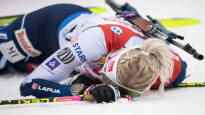The Biathlon World Cup competitions from Anterselva are shown on channels. On Saturday, the women’s pursuit race at 1:55 p.m. and the men’s pursuit at 3:55 p.m. On Sunday, the women’s relay at 12:40 and the men’s relay at 15:30.
The World Cup in Hochfilzen, Austria, was in full swing in the pursuit competition in December, but something happened outside of the TV pictures that has not been publicly revealed to this day. Outwardly, it was only said that Erika Jänkä stopped the competition after shooting third place.
Now the Finnish biathlete tells what happened.
Jängka was facing the first shooting from a vertical position. However, the 27-year-old athlete remembers almost nothing about these moments. The guy was stunned. The competition’s nursing staff quickly came to help. Then he was immediately taken to the hospital.
– Certainly the most dramatic competition and scariest moment of my own career. The lights pretty much went out during the race. I remember that even before the shooting it started to feel special. It felt like it was a bit out in the yard, Jänkä times for Urheilu in Anterselva.
A wide variety of tests were performed at the hospital. The diagnosis was a surprise. The collapse was caused by diabetes, or sugar disease in the vernacular.
– Blood sugar was really high. There was a hyperglycemic state. Alarm bells started ringing in Austria and of course also in Finland, Jänkä opens.
Two upsets
Among the different types of diabetes, Mody3 diabetes was found in Jängka. It is caused by hereditary factors. Jängä’s mother and older brother were diagnosed with type 1 diabetes at the time, so Erika had already been examined for the disease before. It had already been found in the tests carried out at the ages of three and five that he also had the genetic defect that causes diabetes.
Jänkä was therefore aware of the possibility of diabetes. However, he could not believe that diabetes could suddenly break out. However, he has been a basically healthy young athlete.
– It was a shock at first, Jänkä says.
When the diagnosis came out, Jänkä was alone in an Austrian hospital. Although he was very familiar with the disease, the local doctor’s verdict shocked him. The Austrian doctor was very skeptical that Jänkä would be able to continue playing sports at the top level.
– It was shocking shock news. My thoughts started spinning from side to side, says Jänkä about his second shock.
However, the doctor who gave the verdict was not a sports doctor. Jänkä quickly received a different kind of information from the biathlon team’s doctor in Finland Katja from Mjösund.
When Jänkä heard Mjösund’s encouraging words, his thoughts began to turn back to more positive ones.
– I wanted to show that I still compete. However, diabetes is familiar to me from my family. They are fit people and live a full life, says Mjösund.
Through Mjösund, the doors opened. Jänkä received advice and help from many people. It started to become clear that Jänkä could continue his career as a top athlete.
– I am eternally grateful to everyone who helped, Jänkä says.
The parents did not dare to watch the return match
32 days later, Jänkä was at the starting line in front of thousands of people in Ruhpolding, one of biathlon’s most traditional competition locations. Returning to the World Cup rinks felt like a big relief.
Jänkä had been surprisingly calm in his opinion and tried to enjoy competing. The parents, on the other hand, could not even watch the return match.
– The first competition was quite emotional for the parents as well, says Jänkä.
According to him, the comeback race went according to his own level. The result is 78th place with four misses.
Despite the first words of the Austrian doctor, Jänkä is now able to compete in a balanced way again.
Her diabetes isn’t the worst either. Jänkä will probably manage without insulin medication. He is currently using medication in tablet form.
After being diagnosed with diabetes, the athlete has also made small changes to his diet. He keeps sports gels and sports drinks to a minimum before the competition to keep his blood sugar levels under control. The diet is high in fiber so that there is no need to take fast sugar.
Jänkä says that he is now especially looking forward to next summer and the training season. This winter will be spent learning about diabetes.
Olympics in mind
Jänkä, who works as a border guard, is currently optimistic about his future. Health is monitored very closely.
He has a lot of bad seasons behind him after his World Cup debut in the spring of 2017. The bike started spinning in the wrong direction from Oslo. First, every year there was a surgical operation. Then came stress osteopathy and myocarditis.
Jängä’s breakthrough at the international level to the top has not happened so far.
– In elite sports, all small margins play a big role. The differences are quite drastic if there is something wrong with health or something else. Hopefully this diabetes will open up many mysteries that have been there over the years, says Jänkä in the mountain scenery of Anterselva.
The biathlon competitions at the Milan and Cortina D’Ampezzo Olympics are also organized in the town located in northern Italy near the Austrian border. That’s where Jänkä has directed his eyes now.
– That’s a big goal. I believe that the career will continue from there. You won’t see me for many more years from now, Jänkä sends greetings to biathlon fans.
The Biathlon World Cup competitions on the weekend in Anterselva will be shown on channels. Saturday 21.1. women’s pursuit at 1:55 p.m. and men’s pursuit at 3:55 p.m. Sunday 22.1. women’s relay at 12:40 and men’s relay at 15:30.
